Quick, think of a major brand you are familiar with. What words or phrases come to mind? Are they positive, negative, or a bit of both? Have the brands you were introduced to through advertising as a child diminished in quality or service, or has the name stood the test of time?
With almost 2 billion units sold each day, most everyone has heard of or consumed the iconic soft drink, Coca-Cola, also known as Coke. The brand is so popular that in some regions of the U.S., the term "coke" is used generically when referring to other soft drink brands.
Founded in 1886 by a pharmacist in Atlanta, Georgia, the carbonated drink was initially sold at soda fountains until other entrepreneurs discovered how to bottle and distribute the product. In 1916, the design of the coke bottle was standardized and, as they say, the rest is marketing history.
Facing mounting pressure in the early 1980s to recapture market share, the company embarked on a new strategy and introduced "New Coke." The product was a marketing disaster, and the company quickly had to admit they misgauged consumer preference for the original product. The world's No. 1 soft drink had to fight to regain consumer trust, and the failed strategy is an example of "how not to market."
Other brands have come from obscurity to capture the world's attention quickly. However, as their popularity and name identity increases, so too can negative connotations. To gain a feel for how 779 people view 15 of the world's most iconic brands, we measured both their positive and negative responses.
The findings were intriguing; read on to compare your perceptions to those of our respondents.
Eating From a New Apple
Not only did the latter part of the 20th century produce marketing faux pas, but it also created exciting technologies and a new generation of billionaires. When the term "Apple" is mentioned, it no longer is associated with the Garden of Eden's forbidden fruit but rather the famed company that manufactures computers and mobile phones. It's also one of the most valuable brands in the world – with a market value around $921 billion.
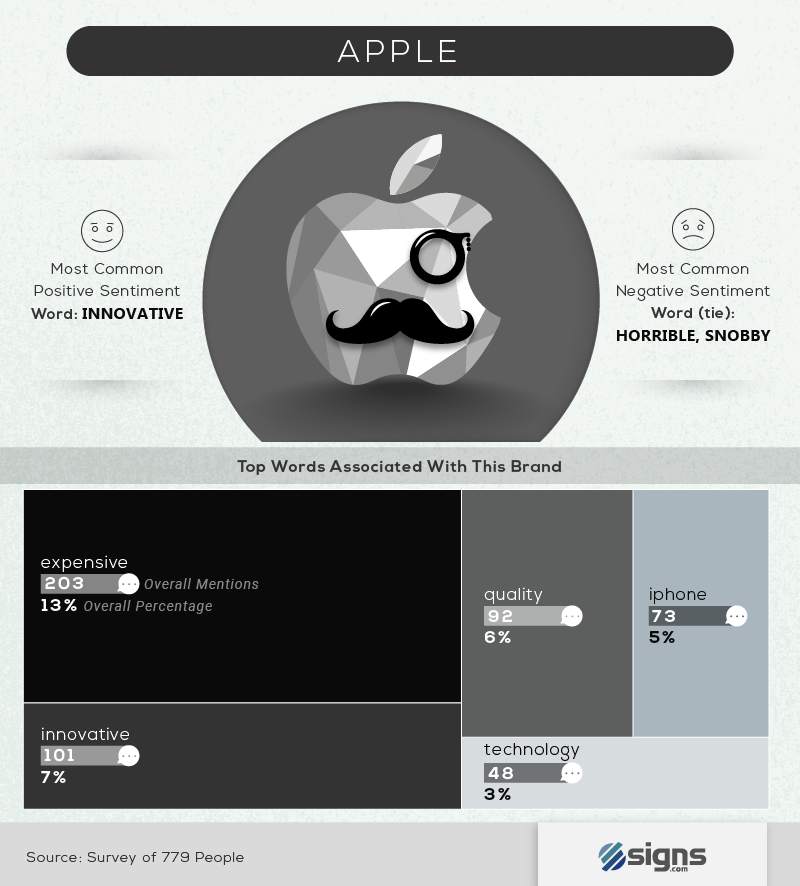
Walk into offices, coffee shops, or university libraries, and you notice Apple products such as laptops and phones in the hands of many people. When asked to describe positive sentiments of the popular hardware maker, words such as "nice," "good," "best-seller," "love it," "awesome," and "amazing" topped the charts.
Apple is so well-known that it ranks in the top 10 best laptops of 2018 by a leading industry website. But much like a school's popular star athlete, with their many fans also come detractors.
Negative Feelings
When asked about negative perceptions of Apple, words such as "death," "dishonest," and "pathetic" were a few used to describe the brand made popular by the late Steve Jobs. Maybe it was the die-hard PC fans who said the brand was "snobby" and "greedy," possibly a reference to the premium price charged for Apple products.
Never a brand designed to appeal to price-conscious shoppers, the price of Apple products continue a steady increase over time, and loyal customers haven't shown much reluctance to paying a premium thus far.
Apple's most well-known product, the iPhone, introduced its latest model, the iPhone XS, in late 2018 with a price tag starting at $1,000, a seemingly insane price – even for a device that serves as a phone, computer, high-tech sound system, and TV.
Searching for the Right Google Word
When a necessary word or tidbit of information is needed for a project or research paper, what is one of the fastest ways to find such information? Here's a hint: It's no longer the multiple volumes of encyclopedias sitting in your parents' den or at the local library.
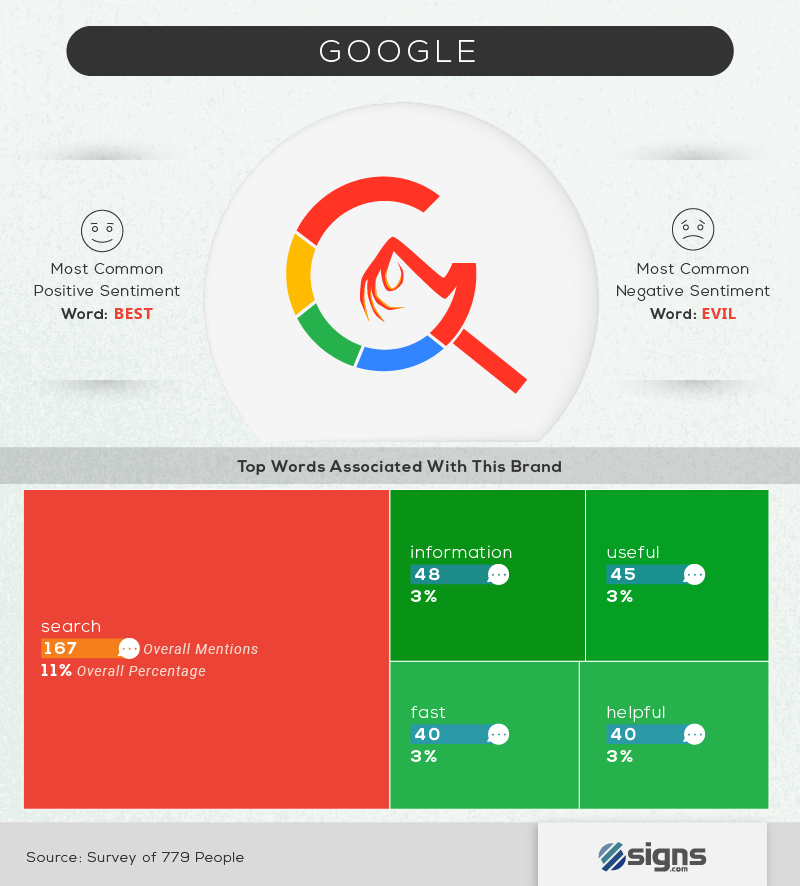
Created as the result of a research project in the mid-1990s by Sergey Brin and Larry Page, today, Google is the world's most popular search engine. Just think, the two Stanford University Ph.D. students even offered to sell their invention in 1999 for $750,000. It was declined, and today, the company is valued at over $600 billion.
You won't be shocked to learn phrases like "best search engine," "best in category," and "best website" are mentioned as positive comments when describing Google.
"Amazing algorithms," the latter word being used to describe an elaborate list of rules in the correct order integrated into a computer code, is a hallmark of Google's success and also used favorably by respondents to describe the search process. Marketers often try to figure out the company's complex algorithms only to find themselves steps behind Google's brilliant programmers.
Negative Feelings
Some of the most negative words used when Google is mentioned are "evil," "dishonest," "deceitful," and "dominating."
However, being on top is never easy, and recently, Google's reputation has taken a few hits, most notably for giving high rankings to fake political news stories that surfaced during the 2016 U.S. general election. The company also faces challenges from other technology companies for allegedly giving low rankings to competitive words and phrases.
In recent news, Google is accelerating the closure of Google Plus, their social networking site, after hackers exposed the data of 52 million users and highlighted privacy concerns.
Your 1,000-Plus Facebook Friends
Who says you only have a handful of friends. The definition of "friends" might produce good conversation at a year-end psychology conference; however, Facebook has certainly changed how we define friendships in the 21st century.
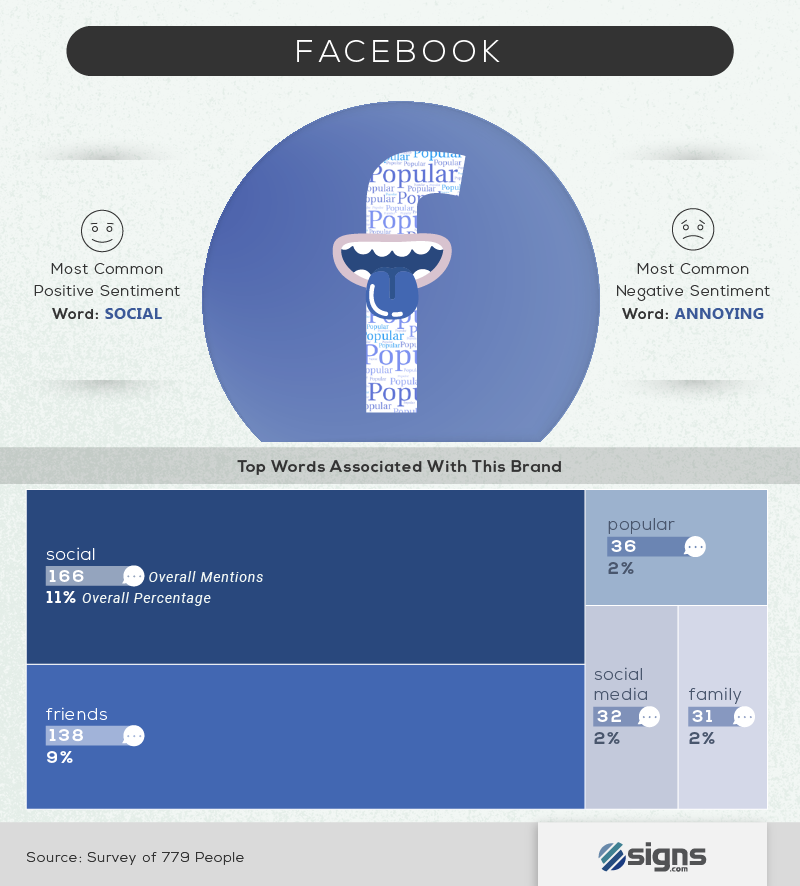
One of the wealthiest and most famous college dropouts is Facebook founder and CEO Mark Zuckerberg.
The former Harvard student concocted his initial social networking site as a way for students to communicate with one another. He also developed Facemash, a site where you could rate the attractiveness of others.
Ranked as one of the most valuable brands worldwide, the popular social media platform has seen tremendous growth over the past 15 years. However, recent concerns over privacy and its inability to negate fake political news stories have tarnished the brand. Its 2012 acquisition of Instagram and other companies has given Facebook additional avenues for increased growth and revenue.
Respondents thought of Facebook as a "very useful social network," also commenting the popular site makes it easier to find friends and to share photos with family. According to the recent statistics, over 1 billion people are active daily users, with over 2 billion people visiting the site each month.
Negative Feelings
For Facebook, when the pendulum swings, it swings widely. Its detractors used such harsh words and phrases as a "pain in the ass," "evil," "dishonest," and "horrible."
2018 proved to be a challenging year for Facebook, as legislative and government bodies in the U.S. and Europe demanded Zuckerberg and other key executives answer a plethora of questions about privacy and the company's inability to monitor political interference from foreign and domestic entities.
Albeit not the first, Facebook is considered by many as the "patriarch" of all social media sites, and both individuals and marketers continue to contribute to its dominance.
The World's Largest Online Mall
If you're curious what keywords are most often associated with Amazon, then consider the obvious because they are "shopping" and "prime." In the past, consumers may have spent hours running from store to store comparing brands and prices. Then, Amazon changed everything.
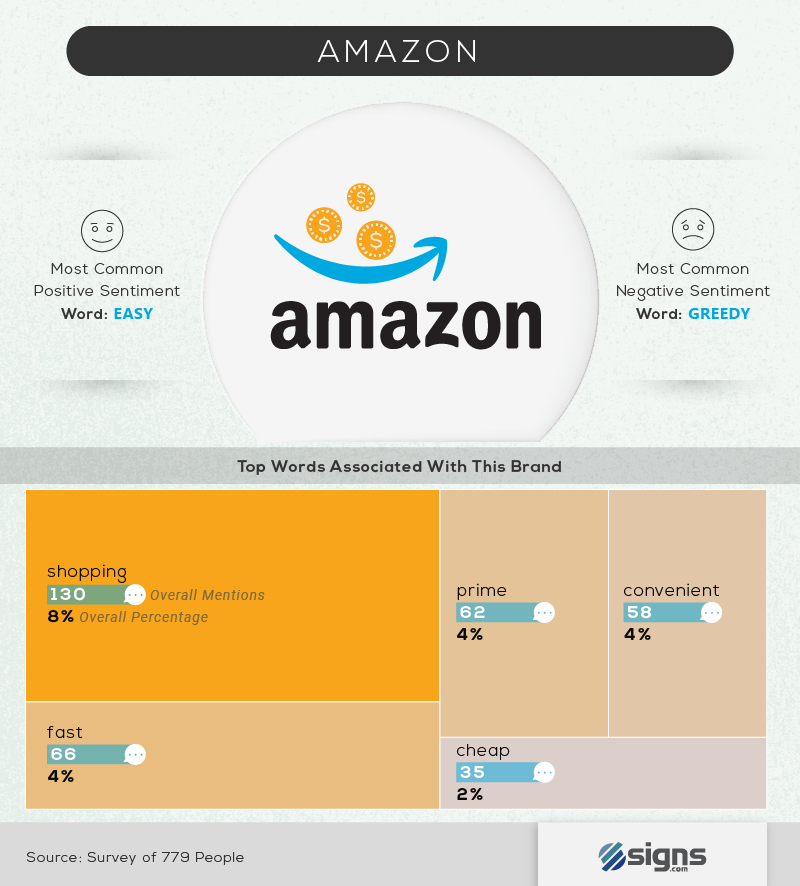
Today, millions of savvy and time-crunched shoppers visit Amazon.com for deals on anything from consumer electronics and clothing to the obscure kitchen gadget they once used while visiting India.
Jeff Bezos launched Amazon in 1995 in his garage as a website to sell books. After going through a handful of potential names, the driven young CEO named his site in honor of the world's largest river, possibly never dreaming it would become the world's most valuable company within two decades.
The growth was explosive. Within the first month, the forming company sold books to customers in all 50 states and in 45 countries around the globe. Bezos and his handful of employees would ring a bell each time a sale was made, gathering around to see if it was from a friend or family member. It wasn't very long at all before the bell retired since sales were coming in so quickly.
When respondents were asked to describe the positive attributes of Amazon, terms such as "best," "best price," "amazing," and " successful" came to mind.
Negative Feelings
However, size and popularity seemed to produce harsh critics too. Words like "evil," "abusive," "treats workers badly," "unfair," and "greedy" are tossed about when Amazon is mentioned.
Even Wall Street is continuing its love affair with the online giant, predicting the company will post 17 percent annual growth through 2023.
It's the "Real Thing"
No single beverage has captured the hearts and taste buds of so many people in the last 133 years as Coca-Cola.
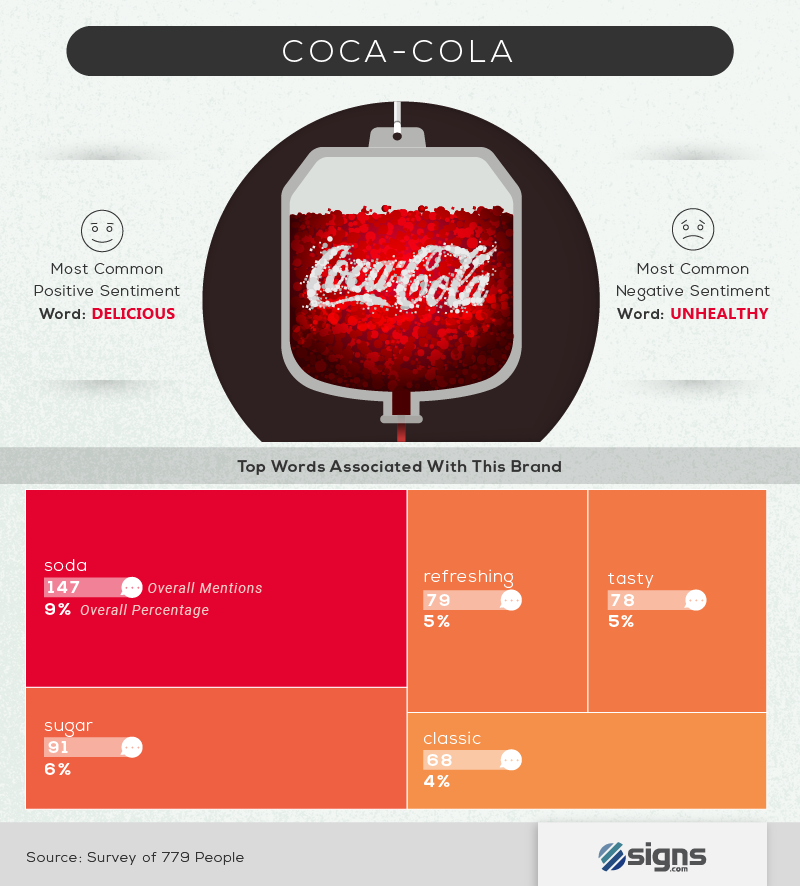
In fact, the cola was so popular in 1925 that the company's advertising slogan was "Six Million a Day." It's now estimated around 1.7 billion servings of Coke are consumed daily.
"Refreshing," "tasty," and "classic" are words most associated with the world's most popular soft drink.
Other positive phrases used by respondents are "great taste," "excellent flavor," and "best quality." Given the company's worldwide exposure and longevity, it's easy to see how it has amassed such a large fan base.
Yet, running a global empire is becoming increasingly more difficult, according to the company's outgoing chairman, citing such challenges as dealing with sociopolitical dynamics and constant economic volatility.
Negative Feelings
The company's detractors we surveyed used words such as "annoying," "stingy," and "greedy." And with consumers becoming more health conscious and watching their sugar intake, the company continues to explore options for healthier products.
Mickey and Minnie's Playground
Walt Disney was rightfully accused of one thing during his lifetime – being a kid at heart and never growing up. Arriving in California in 1923 with little more than high hopes, Walt and his brother Roy have provided memories to many generations since.
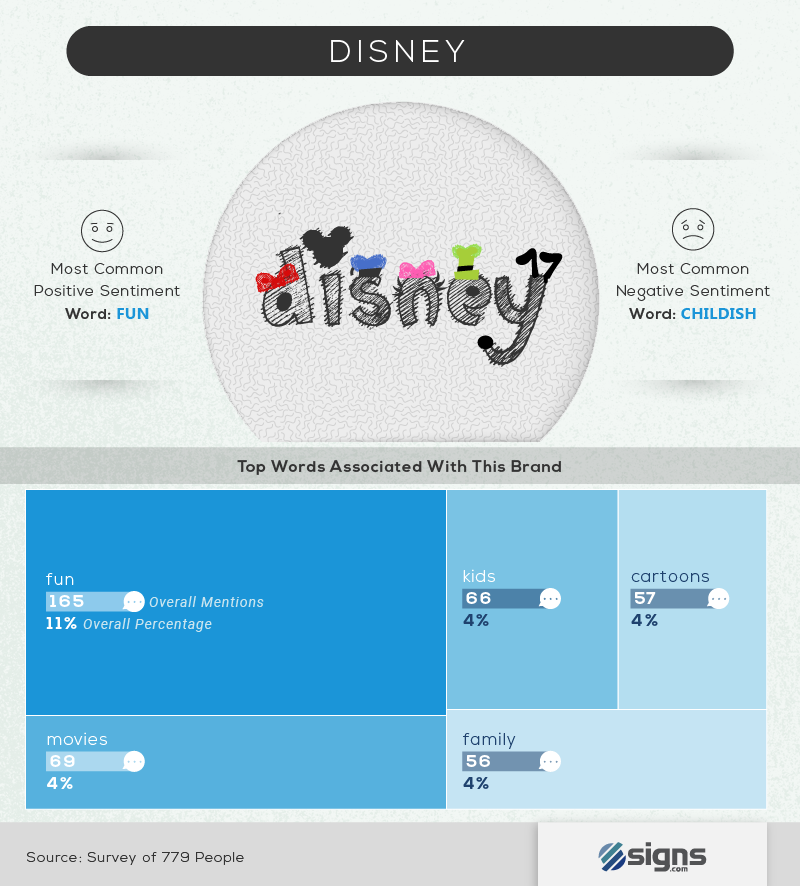
Which words come to mind when you or your family think of Disney? "Fun," "kids," and "cartoons" are three of the most popular mentioned by our respondents.
Disney began to produce animated cartoons in 1927 but soon learned a valuable business lesson after discovering he had unknowingly signed away the rights to his main character, Oswald the Lucky Rabbit. Faced with the challenge of developing a new character, his infamous design of a personality-filled creature would soon be known as Mickey Mouse.
Through cartoons, TV shows, and theme parks such as California's Disneyland and Florida's Disney World, the Disney brand has also created some of the nation's most popular feature films over the years, making a projected $7 billion at the box office in 2018.
Negative Feelings
Overall, Disney's detractors seem frustrated by the company's size and its willingness to tackle controversial social issues. An interesting point is while many respondent's negatively viewed the company as "childish," that's seemingly the sentiment the company's founder and namesake sought to promote when developing characters and programs for children.
Ma Bell Continues to Dominate Our Conversations
Most Americans today – including their parents and grandparents – grew up with access to a telephone, and chances are the equipment or service was provided by one of several AT&T companies.
"Phone" is naturally the first word that comes to mind when AT&T is mentioned, followed by "internet."
The company's origin goes back to the telephone's inventor, Alexander Graham Bell, founded in 1877, one year after Bell invented the first phone. In 1885, the American Telephone and Telegraph Company was created, growing to 24 companies and commonly referred to as "Ma Bell." This system of national phone companies was forced to break up into smaller companies, often referred to as "Baby Bells."
Through a storied and successful history, the company was eventually forced to break up in 1984 as the result of an antitrust lawsuit. With the advent of the internet and increased pressure from competitive long-distance carriers, AT&T broke up again in 2000 and was eventually acquired by SBC, formally a smaller company. Today, AT&T has one of the nation's largest cellular networks.
Negative Feelings
"Best company," "best network," and "excellent service" are often used to describe AT&T. On the flip side, our respondents mentioned "stingy" and "greedy" as negative connotations.
Ronald's Playground Makes a Popular Burger, Too!
Can you name the ingredients to one of the world's most iconic burgers? If two all-beef patties, special sauce, lettuce, and cheese on a sesame seed bun come to mind, then it's McDonald's Big Mac you're thinking about.
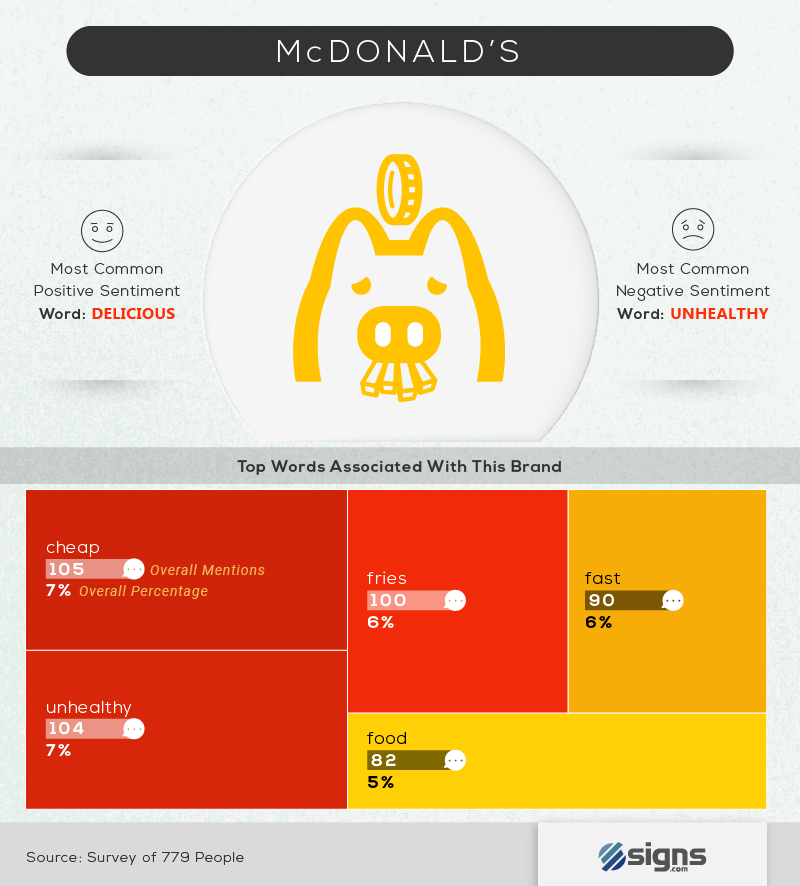
Few cities and towns in the U.S. don't have a burger joint or two on busy corners, thanks to the McDonald brothers, who, in 1948, streamlined the mass production of the modern burger.
By 1954, the McDonald brothers were franchising their restaurant and had met a guy from Chicago named Ray Kroc, who was selling a milkshake-mixing machine. Working as the chain's first franchise agent, he opened a restaurant in Des Plaines, Illinois, in 1955, later acquiring the company along with his brother in 1961 for, what was at the time, an incredible $2.7 million.
Today, the company known for Ronald McDonald and the Golden Arches is reported to have sold over 99 billion burgers, a number that perpetually climbs.
Words mainly associated with the brand are "delicious," "cheap," "unhealthy," "fries," and "fast," all of which are accurate depending on what items are ordered and consumed. And, 70 percent of our respondents mentioned "good customer satisfaction," too.
Negative Feelings
On the downside, words such as "cancer," "killing," "horrible," and "gross" were bantered about when the popular fast-food chain was mentioned.
As an FYI, you may find it interesting that McDonald's is the world's largest distributor of toys through its popular kids "Happy Meals."
General Electric: It's No Longer Your Dad's Company
When people think of GE, the first images that most likely pop up and are echoed by 10 percent of respondents are of appliances such as refrigerators, ranges, microwaves, dishwashers, and the like. Yet, the company is so much more today.
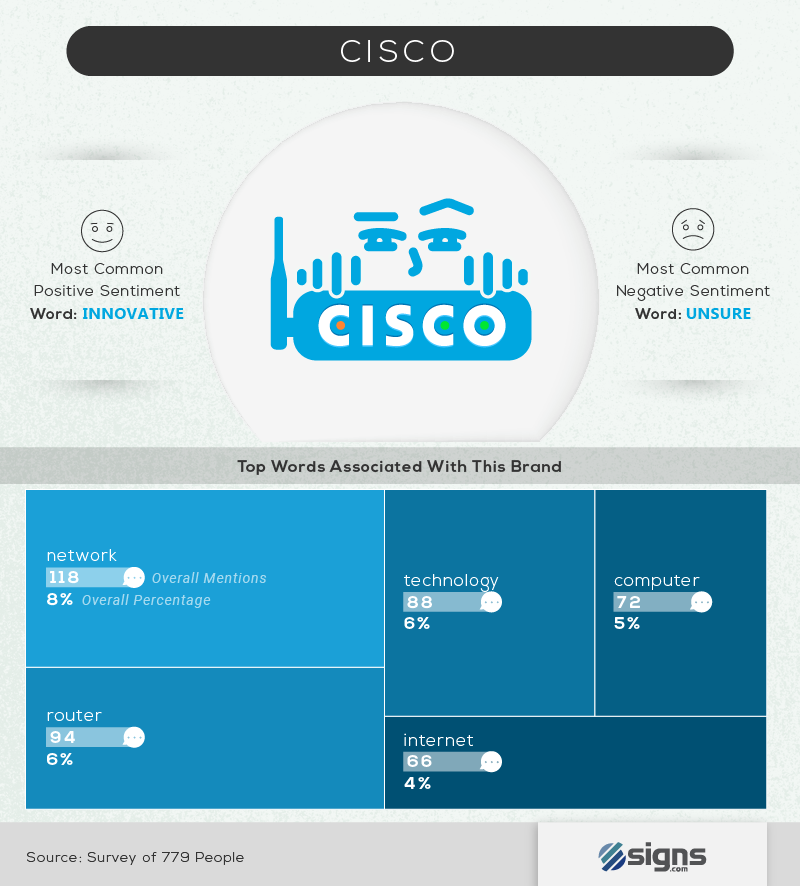
Around the same time the telephone was invented, Thomas Edison, another famous American inventor, was tinkering with electricity. He formed the Edison General Electric Company in 1890, quickly moving from basic lighting to industrial products, power, and medical equipment.
Today, GE has its hand in aviation, finance, and renewable energy with projected 2019 fiscal year sales exceeding $113 billion.
People naturally think of "electric" or "electricity" when GE is mentioned, but given its diversity and product mix, "innovative" is also heard. Other popular words from our respondents included "good value" and "energy efficient."
Negative Feelings
GE's negatives are often associated with the company's production and ties to the nation's military, because "failing," "war contractor," "fraud," "bankrupt," and "polluters" surfaced, too.
Intelligence From Intel
If you've ever used a laptop, desktop PC, or most any Apple product, chances are an Intel processor powered it.
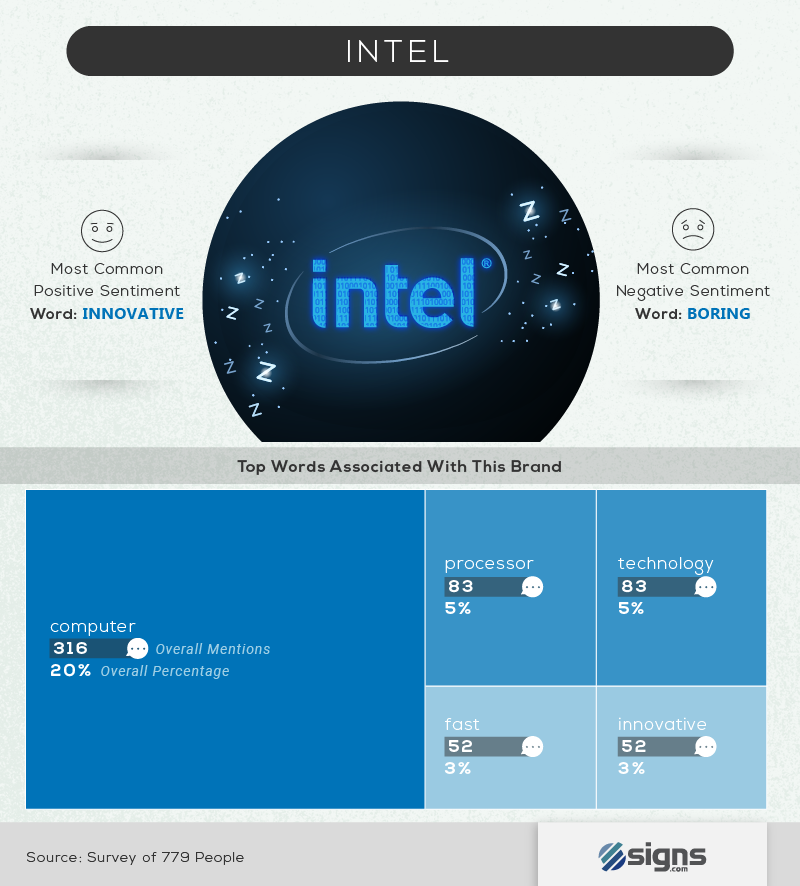
This fast-growing semiconductor company is ranked 45th on the 2017 Fortune list of most admired companies with a market cap of approximately $215 billion.
Established in 1968 by Robert Noyce and Gordon Moore, the duo raised over $2.5 million in just 48 hours. A short nine months later, the company produced its first chip – coined a "computer on a chip." The company's success only grew from there; today, its chips and semiconductors power everything from tablets and games to the world's fastest system networks.
Of interest, 20 percent of our respondents mentioned "computer" when asked about Intel. But Intel doesn't manufacture computers, only the processors that power them, which is most likely why "processor," "technology," and "fast" were mentioned in association with the company.
When it came to the positives, "Nice" and "awesome" were two additional words mentioned about Intel. However some of the negatives were "crappy," "lousy," and "stingy."
Negative Feelings
The negative side? Respondents described intel as "boring." While semiconductors may not be the pinnacle of excitement for everyone, as the stickers that sit on laptops and desktops for years show, Intel's products are inside many of the computers we use every day.
An obscure fact you may not know about Intel is that the theory known as "Moore's Law," which predicts semiconductors' performance should double every two years, was named in honor of Intel's co-founder, Gordon Moore.
Oh My Gosh, You Have a Vuitton!
Few people who shop for or follow luxury brands haven't heard of Louis Vuitton. Whether it's handbags, shoes, or various other leather accessories, carrying or wearing a Vuitton product is viewed as a symbol of luxury and prestige.
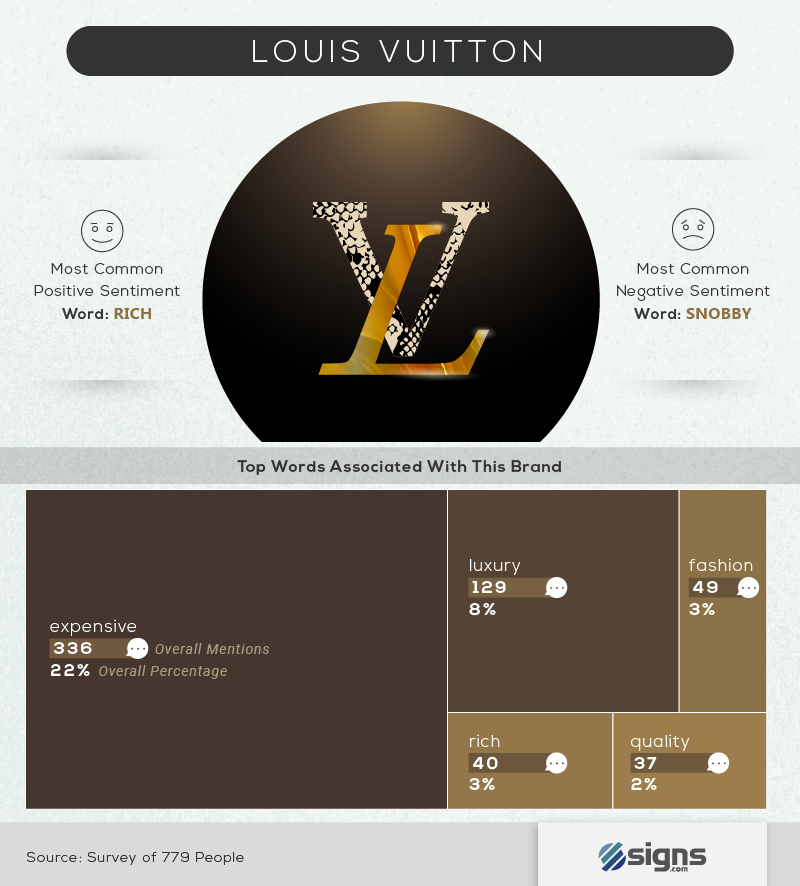
Setting out to be a trunk maker in 1837, the 16-year-old Louis Vuitton likely never imagined his brand would be one of the most sought-after products of luxury buyers. The young Frenchman expanded his operations in 1859 and employed 225 people by 1914.
Today, the company has over 28 flagship retail locations worldwide and is one of the most coveted luxury brands.
Not surprisingly, "expensive" came to mind for over 21 percent of our respondents. Other words were "luxury," "fashion," and "rich," which it helps to be if you desire more than one of the designer products.
Negative Feelings
For some reason, consumers and our respondents mentioned words such as "racist," "arrogant," and "obnoxious" when thinking about the Parisian brand.
As one of the world's most counterfeit and pirated brands, the company spends over $18 million protecting its copyright and trademarks.
The Granddaddy of Computer Networking
While it doesn't manufacture computers, Cisco is well-regarded for its networking, wireless, and security technologies.

Similar to other technology companies founded by West Coast geniuses, Cisco shipped its first product in 1986 and now has over 35,000 employees in 115 countries.
Almost any business with over a handful of employees uses a networking system to store data and run multiple computers. In fact, Cisco is so large that over 85 percent of all internet traffic travels across one of its systems.
True to the company's core business, terms such as "network," "technology," and "router" surfaced when its name was mentioned.
Negative Feelings
The more negative connotations given regarding the company were "unsure," "horrible," and "irritation."
Just Doing It
Walk down the street or through a shopping mall, athletic field, or other populated place and notice the sneaker brand that stands out the most. The chances are high it's Nike's "swoosh" logo, first designed in 1971 by a graphic design student for the whooping sum of $35.
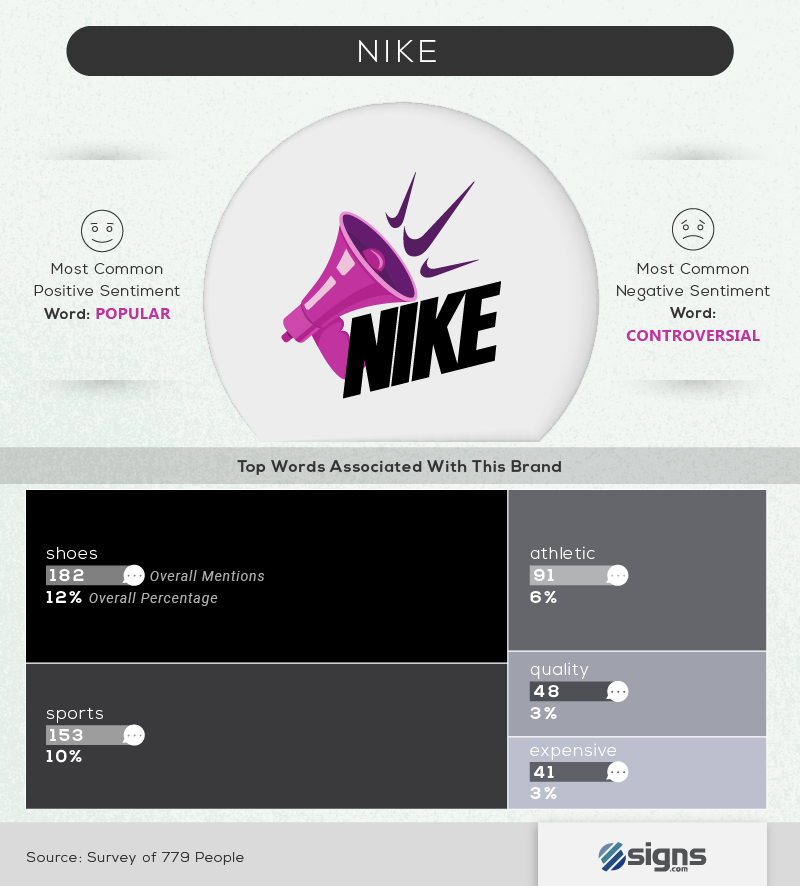
Founded in 1964 by Bill Bowerman, a track coach at the University of Oregon, and runner Phil Knight, the iconic brand has seen explosive growth since opening its first retail store in 1966, under the name Blue Ribbon Sports. In 1978, the company was renamed Nike Inc. and taken public two years later.
The company's image leapt immeasurably in 1984 after signing basketball great Michael Jordan and releasing the athlete's signature Air Jordan shoe. This, by the way, was banned by the NBA for a short while.
Nike exceeded $1 billion in revenue for the first time in 1986, with international sales leapfrogging U.S. sales for the first time in 2003, making it a truly global company. Today, the company's brands also include Converse, Hurley, and Jordan.
The most common word that came to our respondents' minds when asked about Nike was "shoes," "sports," and "athletic." Other phrases such as "awesome," "nice," and "best brand" were tossed about as well.
Negative Feelings
Could such a favored brand possibly have any detractors? Of course, and they came up with such strong words as "hated," "bad," and "unethical."
Although brands like Adidas nip at its heels, financial analysts predict Nike will reach $50 billion in revenue by 2023.
Can You Hear Me Now? Good
Do you know anyone who doesn't have a mobile phone? You may have to think hard because around 95 percent of Americans own a cellphone of some type.
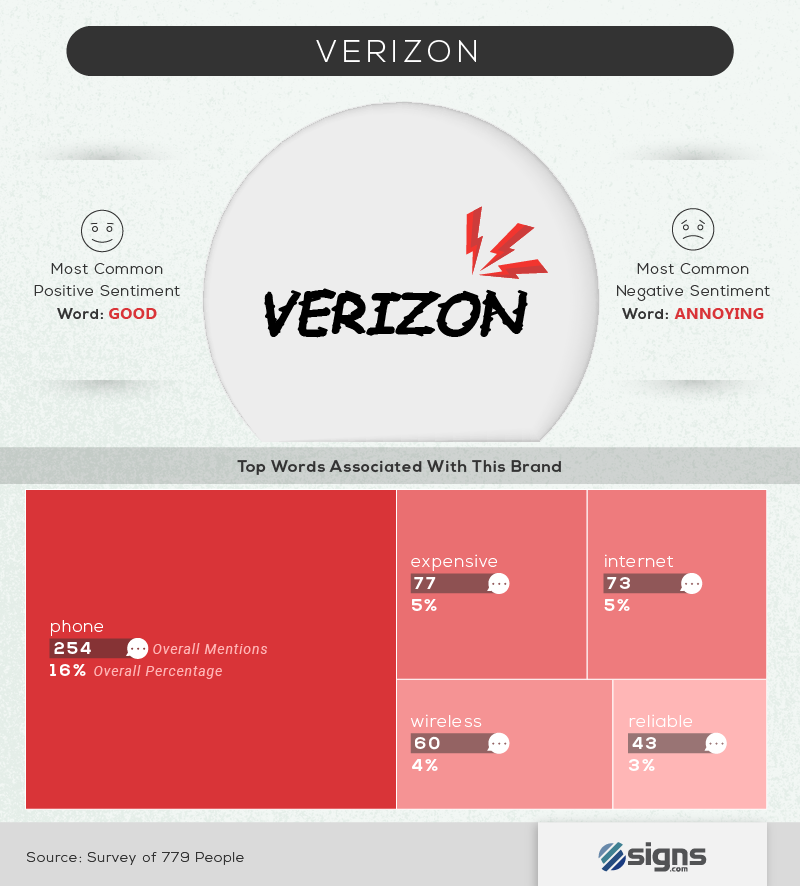
Initially formed in mid-2000 by Bell Atlantic and GTE, the result was one of the largest mergers in U.S. history. Just recently, Verizon completed the first 5G data transmission via a smartphone.
Words used by our respondents to positively describe Verizon were "phone," "internet," and "wireless."
Cellular reliability is a huge issue with most cellphone users. When calls connect quickly and are crystal clear, everyone is happy. But have a call drop when traveling through an area with little or no cell coverage, and expletives may seep out of even the kindest mouths.
Negative Feelings
That might explain why some respondents conjured up words like "worst," "hate," and "bad," when Verizon was mentioned.
Bring Money With You
A German luxury automobile manufacturer, The Bayerische Motoren Werke Company, can trace its roots to 1916, but it wasn't until 1922 that the company became known as BMW.
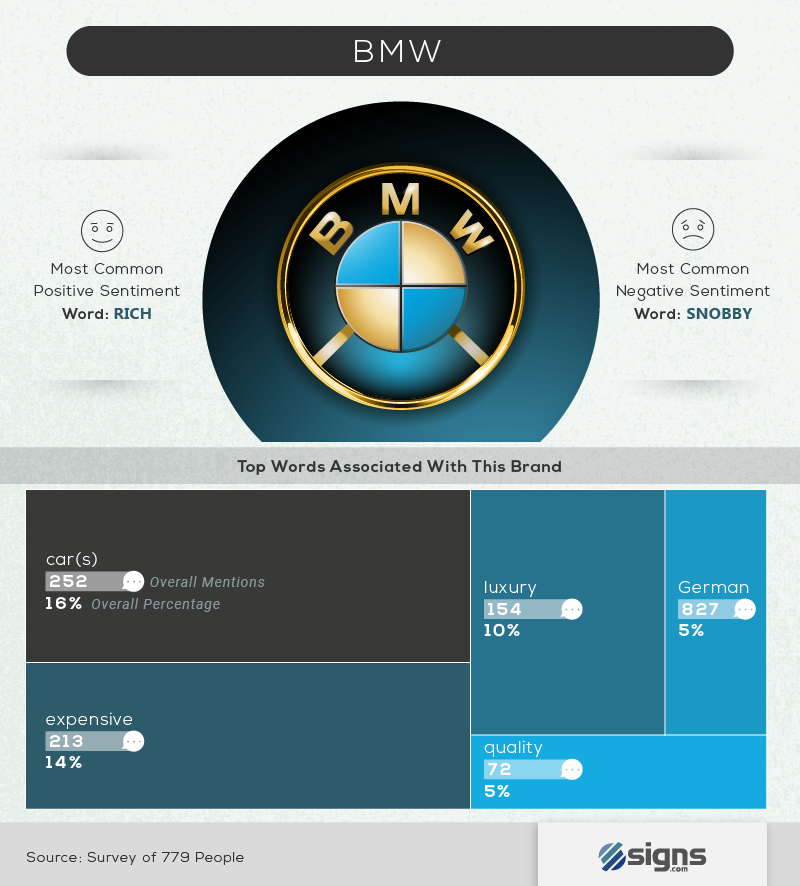
After World War I, the company continued to grow and, a few years later in 1923, began producing motorcycles. By 1933, it added airplane engines to its manufacturing regimen at the behest of the German government. The company's plants were dismantled by allied troops at the end of World War II in 1945. The company was allowed to manufacture motorcycles in 1948, with the first post-war automobile rolling off the assembly line in 1952.
At the end of 2017, BMW sold over 305,000 units in the U.S. with a 1.77 percent market share.
There is no question BMW has gained a reputation as a leading luxury car brand, both in the U.S. and abroad. However, the brand does struggle with a quality perception.
Words that rolled off our respondents' tongues included "expensive," "luxury," and "German." Other phrases like "nice," "good," and "excellence" are also mentioned.
Negative Feelings
As we've seen with other luxury makers or brands, the more popular you are, the more critics you also have. Some of our respondents used the words "lousy," "ugly," and "snobby" when discussing the German car brand.
Methodology and Limitations
Popular brand logos were selected based on Forbes' Most Powerful Brands List and then paired down to 15 brands based on expert opinions of popularity. Once the brands to be analyzed were selected, we collected the opinions of 779 people. Respondents were asked to share the top two words they associated with each brand and one bias they perceived about it.
We then used TextBlob, a Python library that performs common natural language processing, to determine the sentiment of the text. Sentiment is an analysis of how positive, neutral, or negative something is. It uses a basis of scoring of -1 to 1, with -1 being extremely negative, 0 being neutral, and 1 being extremely positive. Due to the fact that this is based on a pre-existing text analysis library, no customization of the dictionary used to analyze the text was possible. As a result, words that may be positive in the context of this topic may not be recognized as positive in this analysis.
Design direction for the reimagining of logos was based on the top words associated with the brand, as well as the most common negative word. Respondent genders were split equally, with 50 percent of our participants being women and 50 percent being men. Age ranged from 18 to 81, our average age was 37, and standard deviation was 11. The information we are presenting relies on self-reporting. Issues with self-reported data may include selective memory, telescoping, attribution, and exaggeration. This is not an exhaustive list, and other problems may arise with self-reported information. We did not statistically test the results we are presenting, and as such, caution that the claims are based on means alone. This project was an experimental and exploratory venture; future research on this topic should be done in a more exhaustive fashion.
About Us
We hope you've enjoyed learning more about some of the brands used by millions of people worldwide. We are eager to help make your company logo or brand stand out.
From banners to yard signs or vinyl lettering, Signs.com has it all.
Sources
- https://www.worldofcoca-cola.com/about-us/coca-cola-history/
- https://www.marketing91.com/coca-cola-brand-failure/
- http://fortune.com/2018/05/21/fortune-500-most-valuable-companies-2018/
- https://www.engadget.com/2018/04/28/best-and-worst-laptop-brands-2018/
- https://www.washingtonpost.com/technology/2018/12/06/your-apple-products-are-getting-more-expensive-heres-how-they-get-away-with-it/?utm_term=.a35bcf801ba7
- https://www.theverge.com/2018/8/21/17763322/iphone-x-galaxy-note-9-smartphone-pricing-2018
- https://www.searchenginejournal.com/seo-101/meet-search-engines/
- https://www.businessinsider.com/facebook-history-photos-2016-9
- https://www.bbc.com/bitesize/articles/z3whpv4
- https://searchengineland.com/google-search-quality-crisis-272174
- https://www.recode.net/2017/4/9/15235940/facebook-instagram-acquisition-anniversary
- https://www.fool.com/investing/2018/06/02/the-3-biggest-challenges-facing-facebook.aspx
- https://www.businessinsider.com/jeff-bezos-amazon-history-facts-2017-4#amazon-wasnt-the-companys-original-name-1
- https://www.cnbc.com/2018/12/11/cowens-internet-analyst-calls-amazon-his-best-idea-for-2019-sees-another-40percent-gain.html
- https://adage.com/article/news/coke-taglines/302205/
- https://brandongaille.com/24-great-coca-cola-sales-statistics/
- https://d23.com/disney-history/
- https://variety.com/2018/film/news/disney-box-office-2018-1203085934/
- http://disneyexaminer.com/2017/06/29/disney-parks-attractions-are-quickly-becoming-part-of-social-issue-dialogue/
- https://beatriceco.com/bti/porticus/bell/bellsystem_history.html
- https://www.nytimes.com/interactive/2016/02/12/technology/att-history.html
- https://corporate.mcdonalds.com/corpmcd/about-us/history.html
- https://people.com/food/11-surprising-facts-about-the-history-of-mcdonalds/
- https://www.ge.com/about-us/history/thomas-edison
- https://www.reuters.com/finance/stocks/financial-highlights/GE.N
- https://www.siliconvalleyhistorical.org/intel-history/
- https://www.fool.com/investing/2017/06/28/9-things-you-didnt-know-about-intel-corporation.aspx
- https://us.louisvuitton.com/eng-us/la-maison/a-legendary-history#tumbler
- https://www.lovemoney.com/gallerylist/52360/the-worlds-most-counterfeited-brands
- https://www.cisco.com/c/en_au/about/who-is-head.html
- https://www.designhill.com/design-blog/9-surprising-facts-you-didnt-know-about-nike-swoosh-logo/
- https://www.kicksonfire.com/history-of-nike/
- https://footwearnews.com/2018/business/athletic-outdoor/nike-market-share-sales-stock-1202665470/
- http://www.pewinternet.org/fact-sheet/mobile/
- https://www.verizon.com/about/news/verizon-completes-first-5g-data-transmission-smartphone
- https://www.bmwgroup.com/en/company/history.html
- http://carsalesbase.com/us-car-sales-data/bmw/
- https://www.signs.com
Fair Use Statement
Learning about some of the most iconic brands and what consumers think about them – both positive and negative – is fun and informative. We're more than happy for you to share these tidbits of information with your readers, just as long as it's for noncommercial purposes. Our only request is you link back to this page so that everyone has access to all of this incredible information.


 Fastest Growing Private Companies in America
Fastest Growing Private Companies in America
